| |
| |
Photographer,
Location |
Images |
Comments |
|

|
Eduardo
Hernandez,
Torreon, Coahuila. Mexico
Oct. 25, 2007 |
#1,
more |
The
gaseous cloud surrounding the comet's core has more than
doubled in radius during the past 24 hours (Oct. 24-25).
"I captured these images on consecutive nights using
the same equipment (a 14-inch
LX200 GPS) and similar exposure times (10x1s),"
says photographer Eduardo Hernandez of Torreon, Mexico.
|
|

|
Don
Barry,
Hartung-Boothroyd Observatory, Cornell University Ithaca,
New York
Oct. 25, 2007 |
#1 |
This
l ong-slit spectrum covers about 2/3 of the visible spectrum.
The slit made a spatial slice across the coma, nicking the
nucleus. The dark absorption bands are primarily the solar
Fraunhofer lines from reflected sunlight (in the blue these
can also be seen in the skyglow away from the comet). The
bright bands are generated by ionized gas seen extending
beyond the inner dust-dominated region.
The
most prominent bandhead in the green is due to the C2 molecule,
as is the fainter bandhead in the blue. Other emission features
in the green and yellow are due to more C2 and NH2. |
|
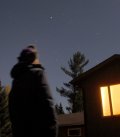
|
Bob
King,
Duluth, Minnesota USA
Oct. 25, 2007 |
#1 |
I've
observed many comets over 30 years but have never experienced
anything like the buttery glow and perfect disk seen in
Comet Holmes. And it gave me such a thrill to watch it evolve
so rapidly. Not wanting to miss a chance at a photo, I set
up my camera in the backyard around 10 p.m. on October 25.
The night was cold and I couldn't get my wife or kids out
to be in the picture so I used the self timer and jumped
in myself.
Photo
details: Nikon
D200, 10" with a 20mm lens at f/2.8 at ISO 200. The
comet is circled. |
|
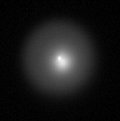
|
Tom
Jorgenson,
Neenah, WI, USA
Oct. 26, 2007 |
#1 |
While
video recording the comet with a JVC camcorder through a
Celestron C-11, I shot some 1,000 CCD frames through a Celestron
C-6 using a Starlight Express MX716 (photo attached). The
comet is spectacular with an extremely bright coma that
gives it that planetary nebula appearance. The CCD image
is a composite of 9 - 0.1 second shots. |
|
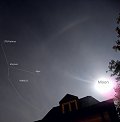
|
Valentin
Grigore,
Targoviste, Romania
Oct. 26, 2007 |
#1,
#2 |
The
comet was perfect visible with naked eyes from Targoviste
town, on a sky with cirrus clouds, full Moon (at perigee)
and a 22° colored halo. Unbelievable that three days ago
this comet was accessible only for big telescopes! |
|

|
Cheng
Tsz Lok,
Hong Kong, Tsuen Wan
Oct. 26, 2007 |
#1,
#2, #3 |
The
image is taken with a Nikon
D100, ISO 200, 8 secs, 12"
LX200 in Hong Kong, a heavily polluted city. A bit under
exposure to reduce the polluted sky and enhanced to view
the nucleus. The core and the coma are easy to seperate.
It seems that you are look from above a cone!! |
|

|
Peter
Lipscomb,
Santa Fe, NM
Oct. 25, 2007 |
#1 |
A
triple panel attempting to show more detail of this fascinating
and unusual comet. Imaged with a DBK 21AF04.AS firewire
camera through a 20" reflector. |
|

|
Michal
Zolnowski-Tiamat,
Cracow, Poland, Solaris Observatory
Oct. 25, 2007 |
#1,
more |
Hallo.
Yesterday I made with my Nikkor 180ED and SBIG STL 11000M
wide field photography of Comet Holmes. This is 10 combined
h-alpha images. Each 900 sec.. On the image is a lot of
nebulas and open clusters in Perseus. Comet is on right
side- round big circle. Best Regards from Poland! Michael
Zolnowski |
|

|
Ginger
Mayfield,
Divide, CO
Oct. 26, 2007 |
#1,
more |
This
comet is lovely with a larger scope. I took this one with
my 14.5 in Starmaster and a Canon
30D. You can see the yellow core and the bluish green
coma. |
|
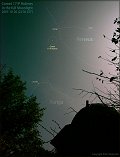
|
Piotr
Majewski,
Torun Centre for Astronomy of the Nicolaus Copernicus University,
Poland.
Oct. 26, 2007 |
#1 |
On
Friday, Oct 26th the Moon was the brightest in 2007 year!
Well, the exploding comet 17P/Holmes was easy visible to
the naked eye, regarding poor observing conditions with
some fog and high altitude clouds. Estimated comet magnitude
was 2.75m.
Photo
details: Nikon
Coolpix 8700, ISO 400, 30s exposure, simple tripod.
|
|
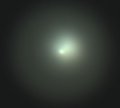
|
Jack Newton,
Arizona Sky Village Portal Az.
Oct. 25, 2007 |
#1 |
The comet is naked eye but can be recorded in a exposure of only a few seconds,
|
more
images (Oct. 26): from
Aaron Worley of Shaker Heights, OH; from
Mircea Radutiu of Bucharest, Romania; from
Ehsan Rostamizadeh of Kerman, Iran; from
Catalin Fus of Alexandria , Romania; from
Saied Bahrami Nezhad of Kerman, Iran; from
Angel Llanas of Leverrier Observatory, Mexico city; from
Florin Marc of Romania; from
Dobesberger Rudolf of Neuzeug Austria; from
Antonio Sanchez-Ibarra of Hermosillo, Sonora, Mexico; from
Les Marczi of Welland, Ontario, Canada.
|
|